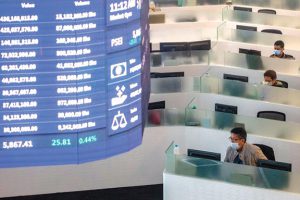Bloomberg
The benchmark Philippine stock index dropped amid a global selloff, as investors awaited economic plans of Ferdinand Marcos Jr. who, based on an unofficial count of the vote, is headed for a landslide win in the presidential election.
The Philippine Stock Exchange Index ended 0.6% down at 6,720.93, its lowest close in nine months. It falls as much as 3.1% earlier. Nineteen of the benchmark’s 30 components declined, with Converge Information and Communications Technology Solutions Inc., AC Energy and Robinsons Land leading the losses.
Equities are unlikely to rally until Marcos lays out a plan
to spur growth, tame inflation
and address the nation’s
ballooning debt, according to analysts. The slide in the benchmark gauge also reflects losses in regional shares as rising US interest rates and slowing
Chinese growth hurt sentiment.
“Marcos has to form his economic team right away to provide local market stability,†said Manny Cruz, a strategist at Papa Securities. “Without an economic team and pronouncements on his economic agenda, it will be difficult to see a rally for investors will be reacting mainly to global headwinds.â€
Based on the broader Philippine Stock Exchange All Share Index’s loss of up to 2.9%, the selloff on Tuesday erased as much as 488 billion pesos ($9.3 billion). Market capitalisation dropped by 168.27 billion pesos at the close. PhilWeb Corp., an operator of bingo parlors, jumped 31%, leading gains among stocks seen as having ties to Marcos. PhilWeb has gained 80% in five sessions.
Over a longer time line, losses in the nation’s equities pale in comparison to the declines in regional shares. The Philippine Stock Exchange Index has fallen 5.6% this year, outperforming the MSCI AC Asia Pacific Index which dropped more than 17%.
Investors should take the opportunity to position amid pullbacks as Marcos will have a “super majority†in Congress, allowing him to push through legislation to boost economic growth and attract foreign investments, said Manny Cruz, a strategist at Papa Securities.
“In the short to medium term, stocks will track the gains posted in 2016 when Rodrigo Duterte was elected and equities rallied when he named his economic team and presented his economic and fiscal agenda,†Cruz added.
“Foreign investors would also like to hear assurances that clean and transparent governance will be pursued. If those fears are allayed, they might decide to buy into the Philippines. The biggest headwind for the Philippines is that it’s a consumer-driven economy that is not on a high note, said Jonathan Ravelas, chief market strategist of BDO Unibank.
“The surveys have already flagged this outcome†and the market will take this result as credible. Investors will stay on the sidelines until the new president provides a clear and concrete plan to tackle rising poverty, strengthen health care, deal with inflation and manage debt,†added Ravelas.
 The Gulf Time Newspaper One of the finest business newspapers in the UAE brought to you by our professional writers and editors.
The Gulf Time Newspaper One of the finest business newspapers in the UAE brought to you by our professional writers and editors.
